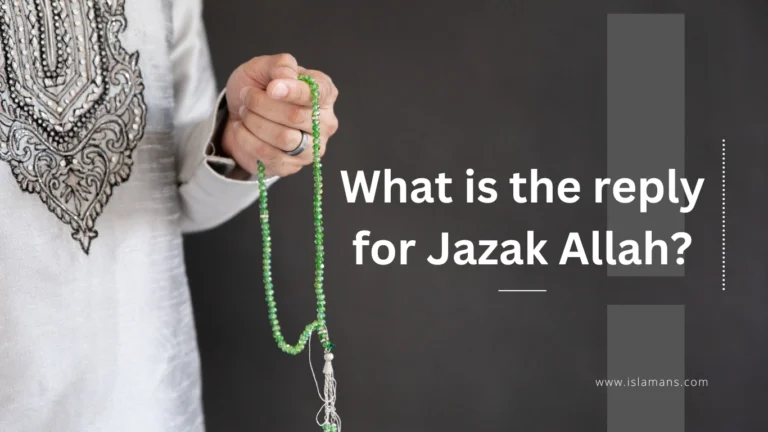In everyday conversations among Muslims, you often hear the phrase “JazakAllah Khairan”. This phrase is more than just a thank you; it carries a heartfelt prayer for the person being thanked. But what is the appropriate way to respond when someone says this to you? This blog post will explore the meaning, context, and various responses to JazakAllah Khairan, helping you understand and use these phrases better.
What Does JazakAllah Khairan Mean?
JazakAllah Khairan translates to “May Allah reward you with goodness.” It’s a way to show deep gratitude while also invoking a prayer for the well-being of the person being thanked. This phrase holds a special place in Islamic culture, reflecting a blend of appreciation and spirituality.
What is the reply for Jazak Allah?
When someone says “Jazak Allah,” meaning “May Allah reward you,” you can respond with “Wa Iyyak” for males or “Wa Iyyaki” for females, both translating to “And you too.” Another heartfelt reply is “Jazak Allahu Khair” (suitable for any gender), which means “May Allah reward you with goodness.” These exchanges not only acknowledge the initial kindness but also build a warm atmosphere of mutual respect and appreciation.
Common Responses to JazakAllah Khairan
Responding appropriately to JazakAllah Khairan acknowledges the gratitude and keeps the conversation respectful and meaningful. Here are some common responses:
- Wa ʾiyyāk (وَإِيَّاكَ) for singular, meaning “And to you.”
- Wa ʾiyyākum (وَإِيَّاكُمْ) for plural, meaning “And to you all.”
Formal Responses
To add a formal touch with flair, consider saying:
- Wa ʾantum fa-jazākumu-llāhu khayran (وَأَنْتُمْ فَجَزَاكُمُ ٱللَّٰهُ خَيْرًا), meaning “And you too, may Allah reward you with goodness.”
Gender-Specific Responses
When addressing males and females, slight variations in the response can make you more precise:
- Wa Iyyaka (وَإِيَّاكَ) for males.
- Wa Iyyaki (وَإِيَّاكِ) for females.
Practical Examples
Here’s how you can incorporate JazakAllah Khairan and its responses into everyday conversation:
Example 1
Person A: Your words are so soothing and speak to the soul.You always inspire me to strive for greatness and do amazing things. JazakAllah Khairan.
Person B: Wa ʾiyyāk.
Example 2
Person A: You did your job very well. JazakAllah Khairan, I really appreciate it.
Person B: Wa ʾiyyāk.
Example 3
Person A: JazakAllah Khairan to all of you for your visit, your precious time, and your graceful ideas.
Group B: Wa ʾiyyākum.
Example 4
Person A: JazakAllah Khairan. You are really a nice and generous person.
Person B: Wa ʾiyyāk.
Example 5
Person A: OK, bye now. Again, JazakAllah Khairan for everything you did for me.
Person B: Wa ʾiyyāk.
Example 6
Person A: JazakAllah Khairan, we all are praying all the time for his speedy recovery.
Person B: Wa ʾiyyāk.
JazakAllah Khairan Reply in Arabic
Understanding how to write this phrase in Arabic can also be beneficial, especially if you are communicating in writing. Here’s how you can write it:
- Jazak Allah in Arabic: جزاک اللہ
- Jazak Allahu Khairan in Arabic: جزاک اللہ خیرا
This will help you use the phrase correctly in written communications, whether in texts, emails, or formal letters.
Different Spellings
You might encounter different spellings for JazakAllah Khairan, all of which convey the same deep gratitude:
- Jazakillahu Khair.
- Jazak Allahu khayran.
- Jazak Allah khair.
- Jazakumullahu khair.
- Jazakumullahu khairan.
The Hadith on Saying JazakAllah Khairan
The significance of this phrase is further highlighted by another Hadith. Usamah bin Zaid (may Allah be pleased with them) reported that the Messenger of Allah (peace be upon him) said, “He who is favored by another and says to his benefactor, ‘JazakAllah Khairan (may Allah reward you well)’ indeed praised (the benefactor) satisfactorily.” This Hadith from Riyad As-Salihin reinforces the importance of expressing gratitude in this manner.
Conclusion
Understanding the depth and context of saying JazakAllah Khairan and its responses can enrich your interactions and reflect a profound sense of gratitude and respect. Whether you are thanking someone or responding to their thanks, using these phrases correctly can make your conversations more meaningful and spiritually rewarding.
Ready to deepen your understanding and use of these beautiful expressions? Start incorporating them into your daily conversations today!

